Collagen is the main structural protein in our body’s connective tissues that makes up about 30% of the whole-body protein. It’s like the scaffolding that supports our skin structure and speeds up the healing process. But here’s the plot twist: As we age and due to other external factors—with sun damage being the biggest culprit—collagen production declines, leaving fine lines, wrinkles, and dull skin in its wake. The silver lining, however, lies in our ability to replenish collagen through supplements and a diet abundant in collagen-rich foods.
From luscious berries bursting with antioxidants to veggies teeming with vitamins, we’ll embark on a mouthwatering journey through the realm of collagen-boosting foods that will leave your taste buds tingling and your skin beaming with vitality. Grab a seat, but first, let’s break down some basics about how the body produces and uses this protein and the role of a healthy diet in supporting collagen production.
The role of diet in supporting collagen
When you chow down on protein-packed foods, your body gets a boost of nutrients that kickstart the collagen production process. You see, these dietary proteins are broken down into amino acids, which are the building blocks of collagen. The process also requires other key nutrients, such as vitamin C, copper, and zinc, to complete the job. So, it’s not just about loading up on protein-rich foods; you also gotta make sure you’re getting your dose of these essential vitamins and minerals to maintain collagen.
Factors affecting collagen production
Aging is the main factor that reduces collagen levels. After the age of 25, the collagen level naturally starts to decrease by 1.5% each year. By age 35, your body will have lost about 15%, and by 45, 30% of the total collagen content. Eating excessive amounts of sugars and refined carbs, smoking, and sunburn are also factors that can wreak havoc on your collagen levels.
Essential nutrients needed for optimal collagen production:
- Vitamin C: Fund in citrus fruits, berries, tomatoes, and leafy greens, vitamin C is like the director, orchestrating the whole process and ensuring collagen synthesis goes off without a hitch. Specifically, vitamin C plays a critical role in converting the amino acids proline and lysine into collagen fibers.
- Zinc: It acts as a co-factor for producing collagen. You find zinc in foods like shellfish, beef, pumpkin seeds, and whole grains.
- Copper: Aids in the cross-linking of collagen fibers for strength and stability. It’s mostly found in organ meats, shellfish, and nuts.[1]
- Proline and lysine: Amino acids that are vital for collagen biosynthesis.[2]
- Antioxidants: They protect against collagen degradation caused by free radicals from sun damage and pollution.
The best foods to boost collagen
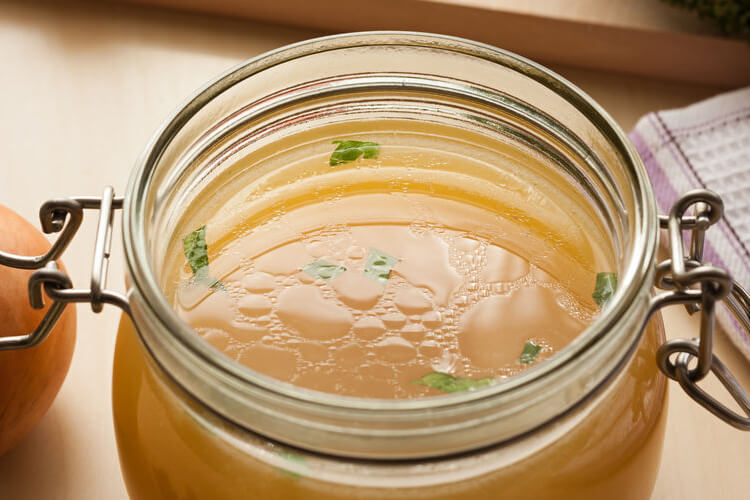
Bone broth
One of the richest sources of collagen-boosting compounds is bone broth. When bones are cooked low and slow, they release gelatin, which is a broken-down form of collagen that is more easily digested and absorbed by the body. Bone broth is also a rich source of minerals, vitamins, and amino acids, which are needed for building and protecting protein fibers. Although one study suggests that it’s unlikely to provide a consistently reliable source of essential amino acids, bone broth is highly nutritious and often promoted as a healthy food rich in collagen.[3]
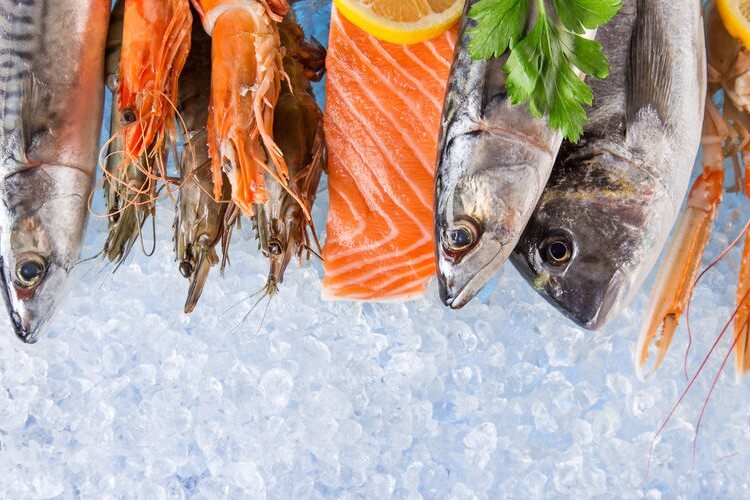
Fish & shellfish
Consuming fish like salmon, tuna, mackerel, and shellfish like shrimp and oysters can surely add to your collagen intake. They’re a rich source of marine collagen, which is easier to absorb by the body—though it contains lower amounts of specific amino acids.[4] However, the flesh of fish is not a particularly rich source of collagen. Instead, most of the collagen is found in less desirable parts, including the skin, scales, ligaments, eyeballs, and bones. Moreover, fish is also rich in omega-3 fatty acids, which help reduce inflammation, and shellfish are excellent sources of zinc and copper, which act like co-factors for collagen.
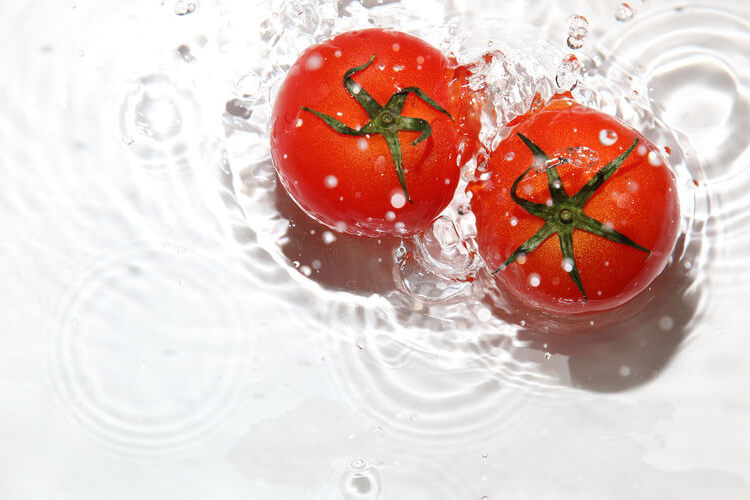
Tomatoes
Those juicy fruits have more to offer than just their tangy flavor. They also contribute to collagen growth. One medium tomato can provide up to 30% of the daily vitamin C intake, a vital nutrient for collagen synthesis. Moreover, tomatoes contain lycopene, a powerful antioxidant that protects collagen from oxidative damage.
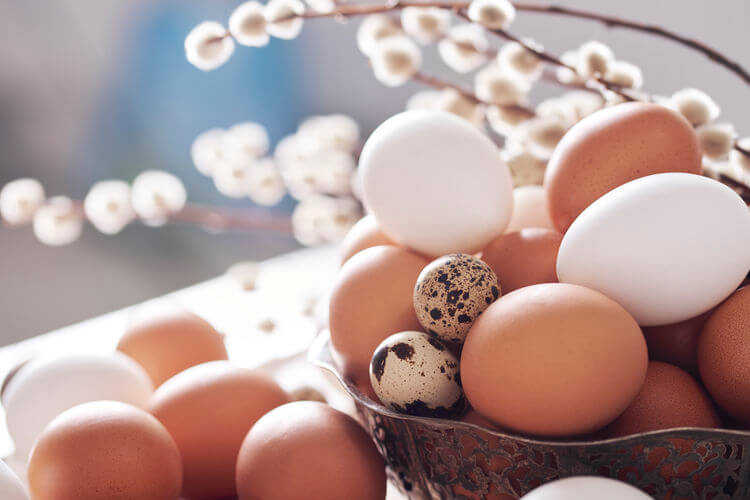
Eggs
Egg whites contain a large amount of proline, one of the essential amino acids for collagen production. Plus, collagen-like proteins (similar to type I ) have been found in the hen’s eggshell membranes and yolk.[5]
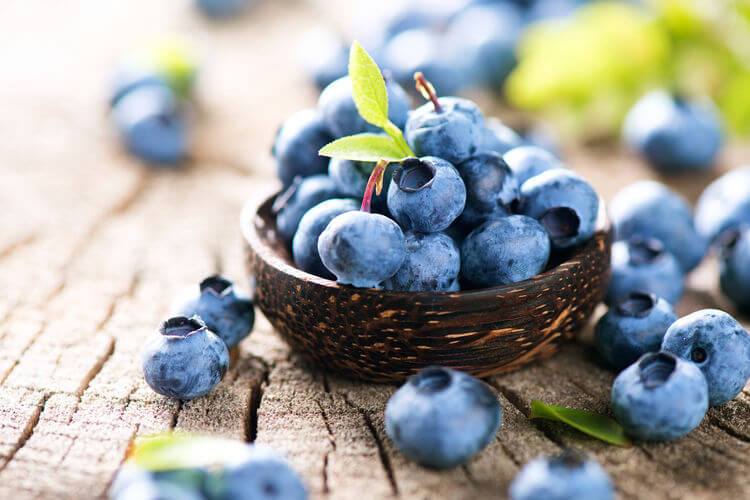
Berries
Raspberries, blueberries, blackberries, and strawberries are good sources of antioxidants and contain enough vitamin C needed for healthy collagen production. Besides, berries contain ellagic acid, polyphenol compound known to reduce UV damage and ease inflammation.[6]
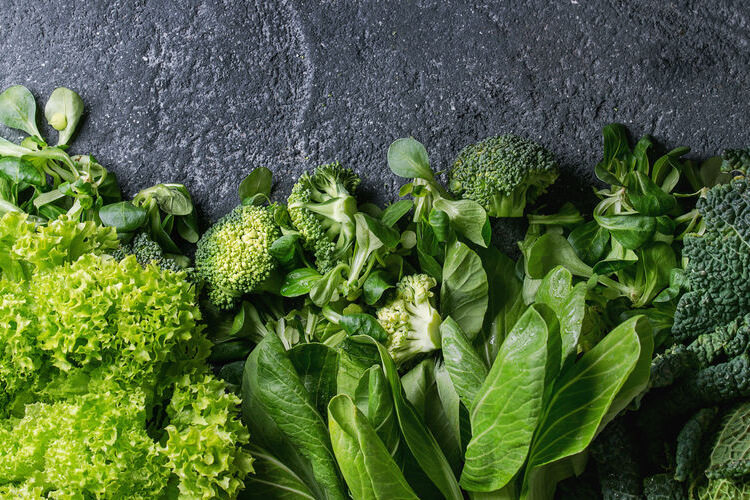
Leafy Greens
Kales, spinach, green beans, and broccoli contain chlorophyll—an antioxidant that increases procollagen in our skin. One study actually shows drinks containing chlorophyll improve signs of photoaging and increase type I procollagen in the skin.[7] These green veggies are also nutrient powerhouses, being loaded with essential vitamins A, C, and E which are vital for collagen synthesis.
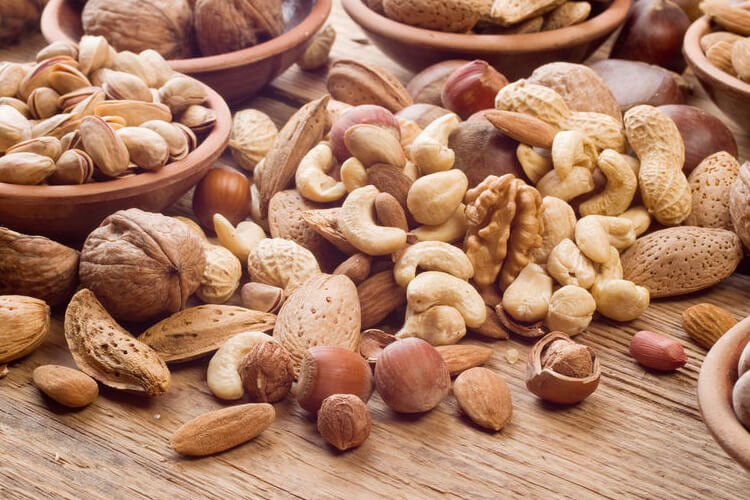
Raw nuts and seeds
Nuts and seeds are a great source of protein and healthy fats. Cashews and chia seeds, for example, are rich in antioxidants, zinc, and copper, essential for helping the body produce collagen. Almonds are a source of vitamin E and copper, and walnuts are rich in fatty acids.
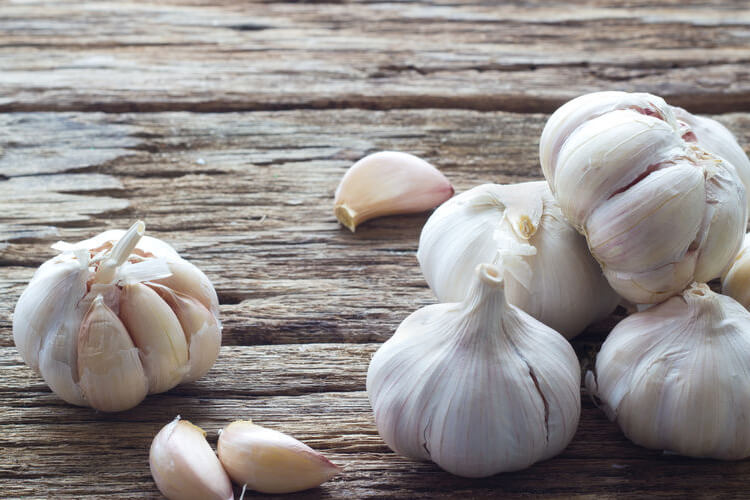
Garlic
Garlic, not only a flavorful addition to dishes, is a true superstar food when it comes to boosting collagen production. It’s high in sulfur—a trace mineral that synthesizes and prevents collagen breakdown. Also, three of the active compounds in garlic (caffeic acid, cysteine, and uracil) were shown to inhibit the degradation of collagen and the enzymes that break down proteins. They also reduce oxidative stress in the skin and help improve wrinkles caused by sun damage.[8]
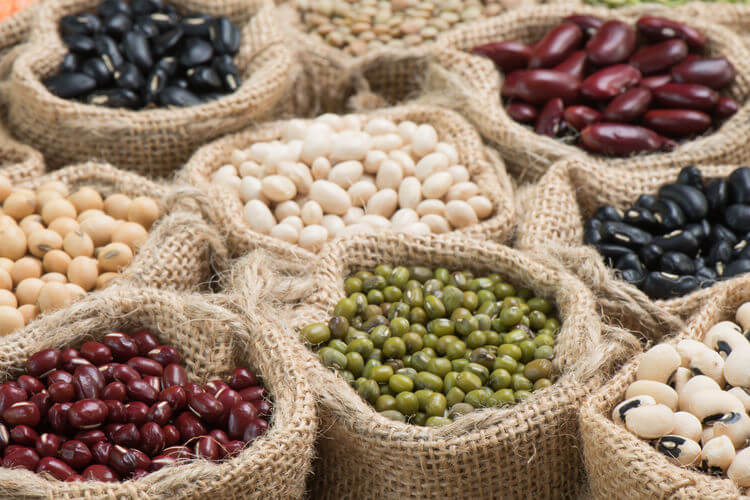
Beans
Beans are super rich in proteins that contain the amino acids required for increasing collagen. Also, some types of beans are rich in copper, another essential nutrient needed to promote collagen.
How to maintain collagen levels
Collagen production is a complex process heavily influenced by various factors beyond just what’s on your plate. It’s about embracing a well-rounded lifestyle with healthy habits. Stay hydrated, protect yourself from the sun, exercise regularly, and avoid smoking and excessive alcohol because they won’t do your collagen any favors. Skincare is also a great place to give your collagen a boost. Look for serums and creams packed with collagen-boosting ingredients like retinol, peptides, and vitamin C.
Footnotes
Women’s Concepts uses reliable sources, including dermatologists’ insights, clinical trials, and scientific journals, to find accurate information and support all the facts shared in our articles. All statements and claims have clear and legit references. Read our editorial policy to learn more about our sources of information, our process of researching and fact-checking the content, and how our team strives to keep all articles updated, completed, and trustworthy.
- Harris ED, Rayton JK, Balthrop JE, DiSilvestro RA, Garcia-de-Quevedo M. Copper and the synthesis of elastin and collagen. Ciba Found Symp. 1980;79:163-82. doi: 10.1002/9780470720622.ch9. PMID: 6110524.
- Albaugh VL, Mukherjee K, Barbul A. Proline Precursors and Collagen Synthesis: Biochemical Challenges of Nutrient Supplementation and Wound Healing. J Nutr. 2017 Nov;147(11):2011-2017. doi: 10.3945/jn.117.256404. Epub 2017 Oct 4. PMID: 28978679; PMCID: PMC5657141.
- Alcock RD, Shaw GC, Burke LM. Bone Broth Unlikely to Provide Reliable Concentrations of Collagen Precursors Compared With Supplemental Sources of Collagen Used in Collagen Research. Int J Sport Nutr Exerc Metab. 2019 May 1;29(3):265-272. doi: 10.1123/ijsnem.2018-0139. Epub 2018 Sep 26.
- Espinales C, Romero-Peña M, Calderón G, Vergara K, Cáceres PJ, Castillo P. Collagen, protein hydrolysates and chitin from by-products of fish and shellfish: An overview. Heliyon. 2023 Mar 29;9(4):e14937. doi: 10.1016/j.heliyon.2023.e14937. PMID: 37025883; PMCID: PMC10070153.
- Wong M, Hendrix MJ, von der Mark K, Little C, Stern R. Collagen in the egg shell membranes of the hen. Dev Biol. 1984 Jul;104(1):28-36. doi: 10.1016/0012-1606(84)90033-2. PMID: 6203793.
- Bae JY, Choi JS, Kang SW, Lee YJ, Park J, Kang YH. Dietary compound ellagic acid alleviates skin wrinkle and inflammation induced by UV-B irradiation. Exp Dermatol. 2010 Aug;19(8):e182-90. doi: 10.1111/j.1600-0625.2009.01044.x. PMID: 20113347.
- Cho S. The Role of Functional Foods in Cutaneous Anti-aging. J Lifestyle Med. 2014 Mar;4(1):8-16. doi: 10.15280/jlm.2014.4.1.8. Epub 2014 Mar 31. PMID: 26064850; PMCID: PMC4390761.
- Kim SR, Jung YR, An HJ, Kim DH, Jang EJ, Choi YJ, Moon KM, Park MH, Park CH, Chung KW, Bae HR, Choi YW, Kim ND, Chung HY. Anti-wrinkle and anti-inflammatory effects of active garlic components and the inhibition of MMPs via NF-κB signaling. PLoS One. 2013 Sep 16;8(9):e73877. doi: 10.1371/journal.pone.0073877. PMID: 24066081; PMCID: PMC3774756.


